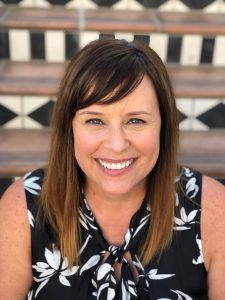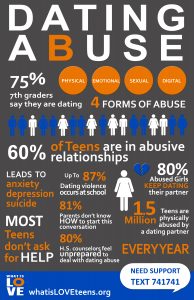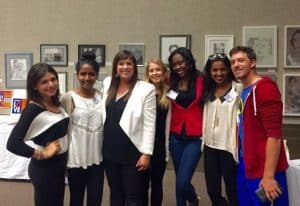BY SAM WATERSTONE | October 9, 2019
Just for a moment, think back to your teenage years. Do you remember your first relationship, that awkward young love that probably included some tearful moments along the way? For many, this is a natural and healthy part of growing up. But for teens that were raised in abusive households, or those who had no positive role models to demonstrate what a healthy and caring relationship looks like, it can be a dangerous and painful experience.
In our society, young people aren’t traditionally taught about healthy relationships in school. Instead, many young people learn – from family members, partners, and even the media – that abusive relationships are “normal” and that “love” is sometimes violent and hateful. This lack of education can lead to a cycle of violence that passes from generation to generation.

According to Christy Stillwell, the Executive Director of the local nonprofit What is LOVE, the story of relationship abuse is all too common. Oftentimes, the cycle of generational violence perpetuates itself through the foundational relationships that shape a young person’s understanding of what love looks and feels like. Surviving a physically or verbally abusive relationship with a dating partner at a young age, or growing up around abuse, can result in a lifetime of painful, unhealthy relationships.
The statistics connected to teen relationship violence are shocking. According to What is LOVE, teens are starting to date earlier than ever before – one study shows that 75 percent of seventh grade students claim to be dating – but most schools around the country still do not provide relationship education. Furthermore, 60 percent of teens report that they are in an abusive relationship (as either the victim, the perpetrator, or both) and data shows that most teens do not reach out for help. Abuse can be physical, psychological, emotional, and digital (online, social media, text messaging, etc.) or some combination of the four, and many victims experience anxiety, depression, and suicidality.

However, educating young people about healthy relationships can help remedy this issue. Forming strong bonds with positive role models can also help young people avoid abusive relationships as they mature. And thanks to dedicated activists and educators like Stillwell, Santa Barbara County teens are now learning how to recognize relationship abuse and access resources they might need.
Stillwell is an expert on breaking this cycle of abuse, in part because she has lived it. Growing up in an abusive household, Stillwell witnessed and experienced domestic violence, and it had a deep and lasting impact on her life.
“I was embarrassed and ashamed that this was happening in my home, and I never told anybody,” Stillwell revealed. “Growing up around that really influences the people that you have in your life, it influences your ideas around relationships. So when I started dating when I was 15, and I didn’t realize it at the time, my dating partners had familiar behavior – what I grew up around. It impacted me in a heavy, profound way. It impacted my grades, my willingness to go to school.”
At 16, the violence in Stillwell’s home became so intolerable that she ran away from home, and eventually ended up in Santa Barbara. While taking an Interpersonal Communication course at Santa Barbara City College, she began learning about deep listening, core values, and what it means to have healthy relationships.
“I remember sitting there [in class] one day with tears running down my cheeks. Nobody had ever had a conversation with me about what healthy is, about how you can work through problems or challenges or arguments in a non-violent way,” explained Stillwell. “And I remember thinking, this would have been really helpful as I was navigating the violence in my home, and as I started dating and being curious about relationships.
“That was kind of my epiphany moment when I realized that I wanted to work with young people and be the activist or educator that I wish I would’ve had when I was a young person. So that is what What is LOVE grew out of: how do we start a conversation, and skill build, and set a strong foundation for healthy behavior for the rest of our lives?”

Stillwell has been working to educate young people about relationship abuse for 25 years, and has developed a research-based curriculum to implement in health education classes. In 2012, Stillwell established What is LOVE, a nonprofit focused on community education, skill building programs for teens, and advocacy work. The organization currently provides educational workshops for parents and teachers, youth relationship coaching for teens, a classroom curriculum and crisis support services.
To learn more about What is LOVE and their inspiring mission to improve the lives of our young people, visit whatisloveteens.org.